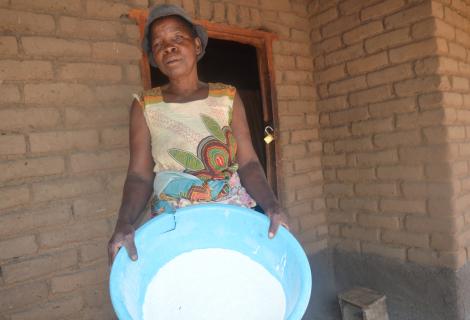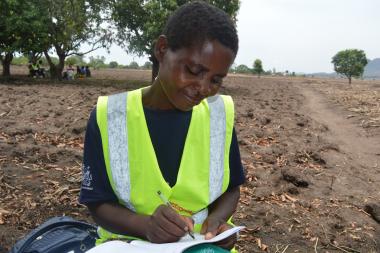Cyclone Idai aftermath: families recovering on empty stomach

Survivors appeal for more food support.
The memory of the Cyclone Idai horror that caught the majority of the households in southern Malawi unawares in March this year might be fading, but for a 62-year-old Estel Howa of Phalombe District, the disaster left more than bitter memories that will take long to heal.

Like few others before, the 2018/2019 farming season promised good tidings for Howa as her maize crop beamed with hope in her two-acre field. It was going to be a season of bumper harvest, she thought.
But the incessant rains that fell one night in February flooded her fields and washed away her crops, mainly maize, which is country’s staple food. While Howa thought that was it, the following month, her crop fields met a similar fate in shape of the Cyclone Idai that destroyed the little that had remained in her field in a tiny Petro-Mula Village, traditional authority Nkhulambe.
In Phalombe District alone, the disaster affected five traditional authorities of Jenala, Chiwalo, Nkhulambe, Kaduya, and Nazombe, rendering about 22,332 households food insecure. A total of 4 642 households are from traditional authorities Nazombe and Nkhulambe where ActionAid Malawi has been implementing its interventions since 2000.
On a national scale, the disaster affected 739 000 people in the country’s 15 districts. A total of 60 deaths and 577 injuries were reported by the Malawi government, which was followed by a declaration of the state of national disaster by President Peter Mutharika.
Eight months down the memory lane, Howa still can’t think of a worse expression to describe the disaster that destroyed her source of livelihood.
“It was terrible,” she says, sitting dejectedly on the veranda of her mud and grass-thatched house.
“I am actually yet to recover from the destruction. I cannot feed my grand children the way I used to because we don’t have enough food since we did not harvest anything from the fields.”
Howa says her family has been relying on food donations from government, non-governmental organisations (NGOs) like ActionAid Malawi and other well-wishers. However, unlike in the immediate aftermath of the disaster, when well-wishers could regularly come with the donations, Howa says the number of those donating has grown thin of late, raising serious food shortage challenge at her house.
Howa’s fear is also captured by the October, 2019 Malawi Vulnerability Assessment Committee (MVAC) report which indicates that a total of one million people, out of the total estimated Malawi rural population of 15 million people will not be able to meet their annual food requirement during the 2019/20 consumption period.
While the report is for the general rural population, the situation could be worse for people like Howa who got hit by Cyclone Idai
Compounding the crisis is the rising maize price which was last seen at K15 000 (about US$20) per 50 kilogram bag. Not a good development for the disaster-hit country whose majority of its citizens live on less than a dollar a day.
Moved by the disaster, ActionAid Malawi, through its women-led local partners, has been in the fore-front conducting periodic assessments and mobilizing support such as food and livestock to donate to the most affected households in the traditional authorities’ Nkhulambe and Nazombe.
ActionAid Malawi trained its women-led partners such as Phalombe Women Forum, Chigwirizano Women Movement in conducting assessment and relevant policies necessary for disaster response intervention implementation.
So far, the organisation and its partners have donated fortified flour to Early Childhood Development Centres (ECD) and maize grain to over 1000 households in the two traditional authorities. The same interventions are also implemented in Nsanje, another southern region district affected by the disaster.
As one way of promoting resilience, the affected households have been engaged in the livestock pass-on programme so they can generate income in the long run. So far, 100 goats have been distributed in the area.
Filiness Biliati, a member of Chigwirizano Women Movement in Phalombe says the assessment they have been conducting shows more people affected by Cyclone Idai will need food between now till the next harvesting season.
“Much as we are on the ground, supporting the affected households with various donations with support from ActionAid Malawi, we feel there is still need for more support, especially food as the outcomes of assessment show that many households are going without food. Urgent food support is required,” she says.
Biliati says the food crisis in the district and across Malawi may prolong beyond the next farming season due to what she described unreliable rainfall patterns caused by climate change.
“Honestly, the rain patterns have become so unpredictable in the recent years, a situation that has led to poor crop yields as most farmers fail to make informed decision,” she says.